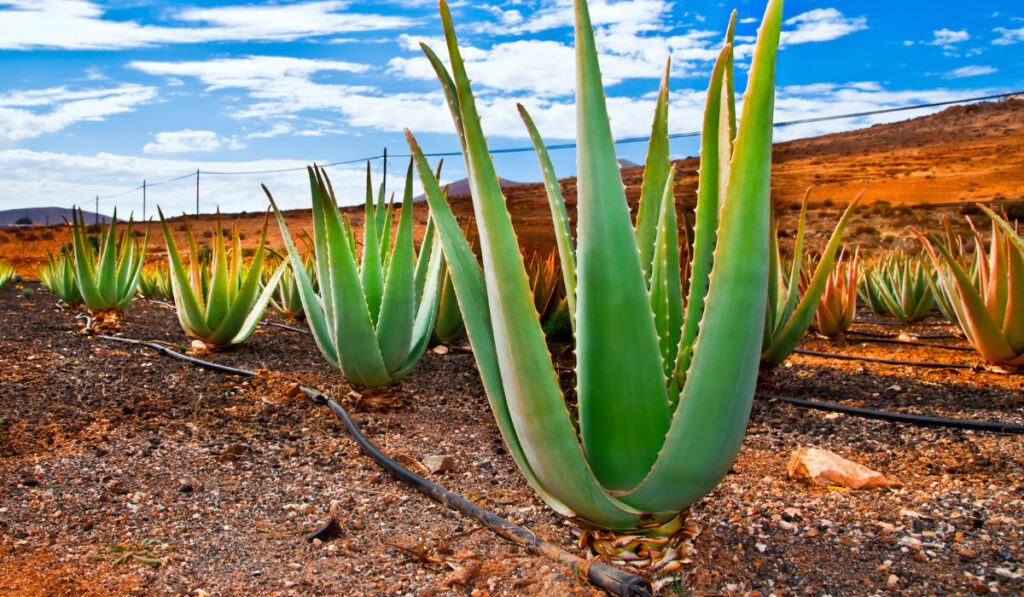Understanding Aloe Vera Advantages
Aloe vera is a remarkable plant with numerous advantages that have made it a popular choice for both skincare and health enthusiasts. One of the key advantages of aloe vera is its exceptional ability to soothe and heal skin irritations. Whether you have a sunburn, minor cuts, or acne-prone skin, aloe vera’s natural anti-inflammatory and antimicrobial properties can work wonders. Its gel-like substance hydrates the skin, promoting faster healing and reducing redness and discomfort.
According to what we know from Kew Gardens, famous for its plant knowledge in England, Aloe vera has been used for a very long time and is still really popular today.
People grow this tough plant worldwide mainly for the useful “Aloe gel” taken from its leaves.
Today, Aloe vera is used in many different ways, including:
- In cooking, where it’s approved by the FDA as a flavoring.
- In beauty products.
- As dietary supplements.
- In traditional herbal treatments.
People have been using Aloe vera for a really long time, even as far back as the 16th century BC. We know this from an old Egyptian medical book called the Ebers Papyrus. In ancient Egypt, they called Aloe vera the “plant of immortality.” A study in the Indian Journal of Dermatology talks about how this plant has been used for healing for a very long time in many different places like China, Japan, India, Greece, Egypt, Mexico, and Japan.
Varieties of Aloe Vera
The NCCIH tells us that there are two important parts of the aloe vera plant for health: aloe leaf and aloe latex.
Aloe Leaf
The fleshy leaves have a clear gel inside them, which can be used in different ways:
- You can put it on your skin to help with burns and skin problems.
- You can drink it as a liquid or in a pill.
Recently, people have started liking aloe vera drinks, like aloe vera juice. To make these drinks, they take the gel from the leaves and mix it with water, as explained by the Cleveland Clinic. Because aloe vera can taste bitter, some brands add flavors or sweeteners, so it’s a good idea to check the label for extra sugars.
Aloe Latex
This yellowish stuff is right under the outer part of the plant’s leaves. The Mayo Clinic says that aloe latex is known for making you poop more, so people take it when they’re constipated.
Discover the Versatile Applications of the Aloe Vera Plant
Aloe vera is a remarkable plant with many uses. Even though it tastes a bit bitter, people all over the world appreciate it for its incredible healing abilities. Aloe vera gel is mostly water, about 96%, but it also contains a mix of things like proteins (18-20 amino acids), various compounds, and several vitamins (A, B, C, D, and E).
Inside aloe vera gel, there’s a special thing called “acemannan,” which is a complex carbohydrate. Acemannan helps nutrients reach our cells, nourishing them and getting rid of harmful toxins. Traditional herbal medicine has praised aloe vera for its healing powers for a long time.
Advantages of Aloe Vera – Aloe Vera is one of the 300 species produced by the aloe plant. It is one of the most commonly and popularly utilized due to its health and beauty characteristics. The Aloe plant is often grown in Africa, Asia, Europe, and the southern and western parts of the United States. This is because these locations are primarily arid and have tropical climates.
Many years ago, people discovered that the aloe plant might be used to treat various skin and health problems. After that, and up until now, aloe vera has been used as a medicine and is also advised by doctors for various health issues.
Contains Healthy Characteristics
Food, cosmetics, and pharmaceutical industries rely heavily on aloe vera due to its widespread use in these fields. Furthermore, according to studies, the global market value of the aloe vera plant (annually) is around $13 billion.
Aloe vera plants are generally known for their thick, sharp, long, green leaves. The average length of an aloe vera ranges between 12 to 19 inches. Each leaf in the plant contains lean tissue. Water is stored in this thin tissue, which causes the leaf to become pointed and thick. However, the stored water is known as aloe vera gel and is termed aloe vera product.
The plant’s gel contains vitamins, minerals, antioxidants, and other nutrients to help with health issues.
Antioxidants & Antibacterial Characteristics
The presence of antioxidants is critical for health therapy. Polyphenols are primarily responsible for the antioxidant gel found in plants. This polyphenol is exceptionally effective at preventing bacteria from spreading and causing illnesses. Furthermore, aloe vera gel has antimicrobial properties, which is why it is sometimes used to heal wounds and skin conditions.
Speeds Up Healing Process
Aloe vera is primarily used as a topical treatment, which means that instead of applying a large amount and allowing it to absorb into the skin, people apply it to their skin and rub it in. It’s commonly used to treat burns and wounds.
Aloe vera is widely used as skin protection in the United States of America. According to studies, Aloe vera is the best treatment choice for patients with 1st or 2nd-degree burns. Another study found that applying aloe vera to a burned post can speed up healing and fill the wound in just nine days. When compared to other types of medication, this one works faster. The gel also helps to reduce irritation and the spread of red spots.
The following study demonstrates what aloe vera can do for burn therapy and how it can speed up healing.
Relief Dental Pain
Tooth decay and gum discomfort are two of the most prevalent ailments. However, aloe vera juice is the most effective treatment for various tooth issues. Aloe vera helps to prevent gum disease and tooth plaque. It also aids in the prevention of bacteria from spreading in the mouth.
According to studies, using aloe vera juice as a mouth rinse for 15 to 30 days can help eliminate dental plaque. When compared to other medications, this treatment is just as successful.
Treating Canker Sores
Canker sores affect the majority of people at some point in their lives. These canker sores usually resemble a little limp that develops beneath the lip and inside the mouth. This canker sore can last anywhere from a few days to weeks.
According to aloe vera studies, researchers have discovered that using aloe vera on a sore helps speed up the healing process. If a sore generally takes more than a week to heal, applying aloe vera gel can speed up the healing process, and you can be free of the upset in a matter of days. This study asked 180 participants with canker sores to apply aloe vera to their wounds. Based on the findings, it was determined that the gel is both practical and quick.
However, the medication was not as effective compared to corticosteroids, which are used to treat ulcers.
Another study found that aloe vera gel accelerates the healing process and reduces discomfort. People suffering from pain can easily apply the gel and feel relief.
Eliminates Constipation
Constipation can be relieved by using aloe vera as a therapy. This time, the latex aids the process rather than the gel. Latex is the sticky yellow residue found beneath the leaf’s surface. Aloin and barbaloin are two types of latex high in chemicals.
However, some concerns have been expressed about the usage of aloe vera latex. This is why this latex is difficult to come by in the United States.
Is Aloe Vera Beneficial for Weight Management?
Some early research suggests that aloe vera might help boost metabolism, which means your body burns more calories during the day and could help with weight loss. But it’s important to know that there isn’t much research on this yet.
In one study with rats, those given aloe vera gel powder weighed less and had less body fat than those who didn’t get it. This might be because they used more energy. However, there aren’t many studies in humans that show the same thing.
Another study found that people with diabetes or who were at risk for it, and who took a special aloe vera gel mix, lost weight and had less body fat and insulin resistance.
Guidelines for Choosing and Preserving Aloe Vera
Aloe vera things are like vitamins, but they’re not checked as carefully by the FDA as prescription drugs. So, we can’t be completely sure if what companies say about their aloe vera products is true. Some things labeled as aloe vera might not really have much aloe in them.
Selection
But, when you buy a product, look for a special mark from the International Aloe Science Council. This group has been around since the 1980s, and if a product has its mark, it means the aloe vera in it has been carefully tested and proven to be good quality.
Storage
To keep your aloe vera product safe, just check the label for instructions. Usually, it’s best to store aloe vera gel and juice in a cool, not-too-damp place, like on a shelf or in the fridge. Humidity and temperature can change how long the product stays good. That’s why aloe vera juice is often in brownish bottles – it helps protect the important stuff inside from light.
Aloe Vera’s Health Concerns
Aloe gel, often found in creams and moisturizers, is usually safe to use on your skin and has healing benefits. However, aloe latex can be risky. If you swallow it, you might get stomach cramps and diarrhea, and it could make your other medications work less well, according to the National Centre for Complementary and Integrative Health NCCIH.
Aloe latex can lead to serious problems. If you swallow even just 1 gram (g) a day for a few days, it might harm your kidneys and, in very severe cases, even be deadly, according to says Mayo Clinic. It can also lower your blood sugar, so if you have type 2 diabetes, you should be careful and talk to your doctor before using aloe latex.
There’s also concern about aloe latex possibly causing cancer. A study by the National Toxicology Program found that it created cancerous tumors in the large intestines of rats when they drank water with 60 parts per million (ppm) of aloin daily. This is much more than the usual industry limit of 10 ppm. However, this study was only done on rats, and the National Institute of Environmental Health Sciences says there’s no evidence in human studies that suggests the same results.
Also, the rats in the study had much more aloin than what’s typically considered safe for humans, so it’s unlikely you’d reach dangerous aloin levels, according to the NIEHS.
Can You Develop Aloe Vera Allergies?
While not common, you can get allergies to aloe vera, as mentioned by Mount Sinai. Allergies to aloe can be risky and cause problems like skin rashes, a tight feeling in the throat, trouble breathing, or chest pain.
Conclusion
Beyond its skincare benefits, aloe vera also offers advantages for internal health. Drinking aloe vera juice can aid digestion and relieve symptoms of gastrointestinal discomfort, thanks to its natural laxative properties. It is also rich in vitamins, minerals, and antioxidants, contributing to a boosted immune system and overall well-being. Incorporating aloe vera into your daily routine, whether through topical application or as a supplement, can provide a range of advantages for your skin and health, making it a versatile and valuable natural remedy.
FAQs
FAQ1. Is aloe vera safe for consumption, and what are its potential health benefits when ingested?
A1. Aloe vera is generally considered safe for consumption when used in moderation. It may have potential health benefits, such as aiding digestion, supporting the immune system, and providing essential vitamins and minerals. However, it’s essential to consult with a healthcare professional before adding aloe vera supplements or products to your diet, especially if you have any underlying health conditions or are taking medications.
FAQ2. How can one differentiate between high-quality aloe vera products and those of lower quality, given the limited FDA regulation in the supplement industry?
A2. To distinguish between high-quality aloe vera products and lower-quality ones, look for the seal from the International Aloe Science Council on the product. This seal indicates that the aloe vera’s quality and purity have been rigorously tested and confirmed. Additionally, read product labels carefully, check for third-party testing and certifications, and consider reputable brands with positive customer reviews.
FAQ3. Are there any known side effects or contraindications associated with the use of aloe vera for various health purposes, and what precautions should individuals take when incorporating it into their daily routines?
A3. While aloe vera is generally safe, some individuals may experience mild side effects like digestive discomfort or skin irritation. It’s essential to perform a patch test before using aloe vera topically and start with a small dose when consuming it. Pregnant or nursing women and individuals with certain medical conditions, such as kidney issues or allergies, should exercise caution or consult a healthcare professional before using aloe vera for health purposes. Always follow recommended dosages and usage guidelines provided by the manufacturer.







